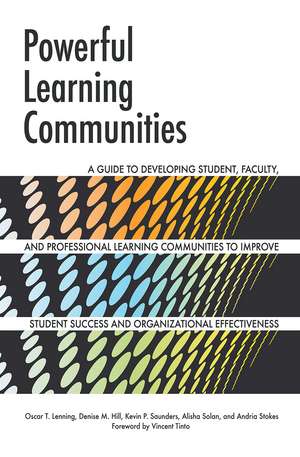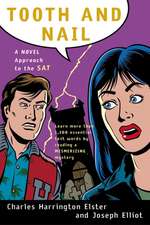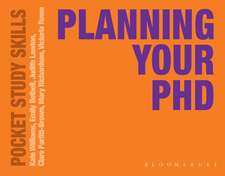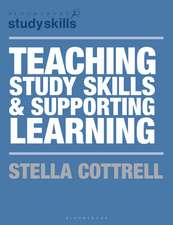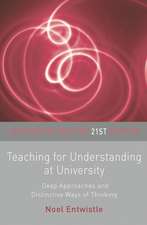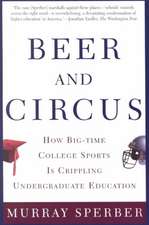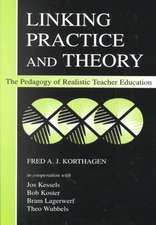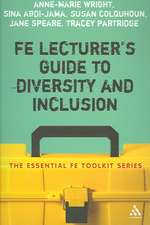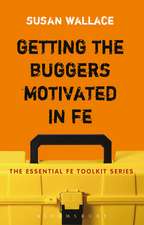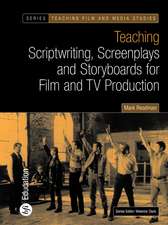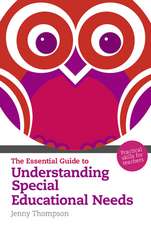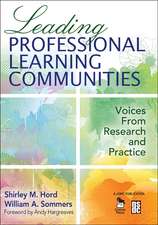Powerful Learning Communities: A Guide to Developing Student, Faculty, and Professional Learning Communities to Improve Student Success and Organizational Effectiveness
Autor Oscar T. Lenning, Denise M. Hill, Kevin P. Saunders, Andria Stokes, Alisha Solanen Limba Engleză Paperback – 12 feb 2013
| Toate formatele și edițiile | Preț | Express |
|---|---|---|
| Paperback (1) | 311.64 lei 6-8 săpt. | |
| Taylor & Francis – 12 feb 2013 | 311.64 lei 6-8 săpt. | |
| Hardback (1) | 1006.25 lei 6-8 săpt. | |
| Taylor & Francis – 12 feb 2013 | 1006.25 lei 6-8 săpt. |
Preț: 311.64 lei
Nou
Puncte Express: 467
Preț estimativ în valută:
59.63€ • 62.14$ • 49.38£
59.63€ • 62.14$ • 49.38£
Carte tipărită la comandă
Livrare economică 03-17 aprilie
Preluare comenzi: 021 569.72.76
Specificații
ISBN-13: 9781579225803
ISBN-10: 1579225802
Pagini: 370
Dimensiuni: 152 x 229 x 23 mm
Greutate: 0.5 kg
Ediția:New.
Editura: Taylor & Francis
Colecția Routledge
Locul publicării:Oxford, United Kingdom
ISBN-10: 1579225802
Pagini: 370
Dimensiuni: 152 x 229 x 23 mm
Greutate: 0.5 kg
Ediția:New.
Editura: Taylor & Francis
Colecția Routledge
Locul publicării:Oxford, United Kingdom
Public țintă
Postgraduate and Professional Practice & DevelopmentCuprins
Acknowledgments Foreword Vincent Tinto INTRODUCTION. WHY WRITE THIS BOOK? The Audience for This Book How to Use This Book New Data. The “100-Institution Survey” Definition of Concepts and Key Terminology Why Create Learning Communities? 1. THE SCOPE AND TYPES OF LEARNING COMMUNITIES The Scope of LCs Factors/Facets of LCs A Typology of LCs LC Subtypes for Membership Facet Conclusion For Reflection 2. PREPARING FOR POWERFUL LEARNING COMMUNITIES Creating Purposeful LCs That are Powerful Conducting an Environmental Scan Principles for Design of Powerful LCs Designing Powerful LCs Conclusion For Reflection 3. CREATING AND IMPLEMENTING OPTIMAL FACE-TO-FACE, VIRTUAL, AND HYBRID LEARNING COMMUNITIES Comparison of Outcomes In Face-To-Face, Virtual, and Hybrid LCs Essential Processes Common to All Three Delivery Modes Essential Processes Unique to Face-To-Face LCs Essential Processes Unique to Online LCs Processes Unique To Hybrid LCs Conclusion For Reflection 4. CONCEPTUAL FRAMEWORKS FOR CREATING POWERFUL LEARNING COMMUNITIES Focusing on Learning in LCs Instructional Design Frameworks Holistic Frameworks Development Frameworks Overall Guiding Framework in the Creation of Powerful LC Conclusion For Reflection 5. ACHIEVING OPTIMAL STUDENT SUCCESS THROUGH POWERFUL SLCs, PLCs, AND LOs Developing Powerful SLCs Developing Powerful PLCs Developing Powerful LOs Conclusion For Reflection 6. CREATING ETHICAL AND LEGAL LCS Membership and Access Relationships Integrity, Privacy, and Liability Conclusion For Reflection 7. ASSESSMENT GUIDELINES FOR DIFFERENT TYPES OF LCS Connections to Research The Assessment Cycle Strategies to Create Powerful LC Conclusion For Reflection 8. ADDRESSING POTENTIAL PROBLEMS FOR POWERFUL LCS Overcoming Potential Problems for LC Success Conclusion For Reflection APPENDICES APPENDIX A—COLLEGES AND UNIVERSITIES SELECTED FOR THE 100-INSTITUTION SURVEY APPENDIX B—COMPENDIUM OF KEY FACTORS RECOMMENDED IN THE RESEARCH TO BUILD POWERFUL LCs APPENDIX C—POWERFUL LC PLANNING FORM APPENDIX D—EXPERIENTIAL EVIDENCE THAT FACE-TO--FACE AND VIRTUAL LCs DEPEND ON THE SAME PRINCIPLES AND TECHNIQUES APPENDIX E—100-INSTITUTION SURVEY RESPONSES REGARDING WHAT MAKES THE INSTITUTIONS’ SLCs UNIQUE OR INNOVATIVE AND EFFECTIVE/POWERFUL APPENDIX F—KEY LAWS AND LEGAL RESOURCES IMPACTING LCs REFERENCES ABOUT THE AUTHORS INDEX ADDITIONAL APPENDICES APPENDIX G—A BRIEF HISTORY OF LCs APPENDIX H—A CALL FOR AND EVIDENCE OF EDUCATIONAL CHANGE APPENDIX I—WITHIN-CLASS LCs DEFINED APPENDIX J—MORE DETAILS ABOUT LEARNING PERTAINING TO DELIVERY FORMATS FOR SLCs APPENDIX K—THE ROLE OF CONCEPTUAL FRAMEWORKS IN LCs APPENDIX L—WEBSITE URLs PERTAINING TO LCs FOR 100-INSTITUTION SURVEY COLLEGES AND UNIVERSITIES APPENDIX M—EXAMPLES OF INSTITUTIONAL LC SUPPORT MATERIALS
Notă biografică
Oscar T. Lenning is retired from academics and is now Director of Lenning Consulting Services. After 15 years of research, writing and consulting at ACT and NCHEMS—and 20 years as academic VP and dean at colleges in New York, Iowa and Oklahoma—he spent eight years leading development of innovative new programs at three different collegiate institutions. Author of 130+ professional publications, his chapter on “Assessment and Evaluation” in1981 and 1989 in Delworth and Hanson’s Student Services: A Handbook for the Profession became the standard for the student affairs profession in that area during the 1980s and much of the ‘90s. Denise M. Hill is Assistant Professor at Des Moines University teaching health law and ethics. She is also an adjunct faculty member at Drake University Law School and an of counsel attorney at the Whitfield and Eddy law firm in Des Moines. She is active in promoting cross-curricular and institutional learning opportunities and founded the first MHA student chapter in the nation of the American Health Lawyers Association. A trained mediator and frequent public speaker, previously she practiced law at two large law firms, was Manager of Public & Regulatory Affairs for the Iowa Medical Society and served as a labor relations attorney for the Iowa Department of Personnel. Kevin P. Saunders is Director of Academic Assessment at Drake University. Previously he served as the coordinator of continuous academic program improvement, chaired the learning communities assessment subcommittee, and taught research and evaluation courses at Iowa State University. He is a former resource faculty member for the Evergreen State College Learning Community Summer Institute and is a current Teagle Assessment Scholar. Andria Stokes is the director of the Center for Transformational Learning and Assistant Professor of Education at Avila University in Kansas City, MO. Her specialty is cognitive education; her focus has been on inquiry and const
Recenzii
"Drawing on a 100-institution survey as well as their own experiences, the five authors have collaborated to create this well-organized, thorough guide. Anyone in higher education seeking to advocate for, create, or expand or refine the learning community approach at their institution will find here plenty of creative ideas and supportive data. Material is organized logically beginning with conceptual underpinnings, a typology of learning communities, and design and implementation in face-to-face, virtual, or hybrid settings. Subsequent coverage includes student success, legal and ethical issues, assessment guidelines, and potential pitfalls and how to deal with them. Lenning (emeritus, with a long list of affiliations from a long career) co-authored an earlier book The Powerful Potential of Learning Communities (1999) for which this work can be considered a sequel."
Book News, Inc.
“Powerful Learning Communities combines a comprehensive review of learning community structures and implementation with a consistent focus on maximizing student learning. The examination of many types of LCs across institutions reinforces the assertion that building institutional partnerships and systemically implementing LC principles are essential elements of transformative and sustainable change. The appendices provide excellent resources for the practical application of principles and research results presented in this book."
Anne Goodsell Love, Associate Provost for Assessment, Wagner College
"Powerful Learning Communities is an important book that closes the gap between theory and practice. The unique, lively 'scenarios' included in every chapter tell the stories that make the research meaningful and relevant. The authors have organized an immense amount of material by anchoring current research findings in authentic academic situations that we can all recognize. This book will be a wonderful professional development resource for institutions looking to introduce or expand learning communities."
NancyShapiro, University System of Maryland
and author of Creating Learning Communities and Sustaining Learning Communities
"The authors delineate various strategies institutions have employed to successfully implement learning communities and the types of commitments and partnerships that institutions, faculty, and staff have to make to see them fully implemented. In these and many other ways, Lenning and his colleagues have put into one place information and insights that we would otherwise have to glean from a wide range of resources, some more difficult to locate than others. All who are interested in developing learning communities owe them a debt of gratitude."
Vincent Tinto, Syracuse University
“Oscar Lenning and his colleagues have produced a landmark scholarly and policy statement on effective learning communities. It should be read by every faculty member and administrator in postsecondary education who is concerned with maximizing the developmental potential of this powerful educational intervention for students.”
Ernest T. Pascarella, Professor and Mary Louise Petersen Chair in Higher Education, The University of Iowa
Book News, Inc.
“Powerful Learning Communities combines a comprehensive review of learning community structures and implementation with a consistent focus on maximizing student learning. The examination of many types of LCs across institutions reinforces the assertion that building institutional partnerships and systemically implementing LC principles are essential elements of transformative and sustainable change. The appendices provide excellent resources for the practical application of principles and research results presented in this book."
Anne Goodsell Love, Associate Provost for Assessment, Wagner College
"Powerful Learning Communities is an important book that closes the gap between theory and practice. The unique, lively 'scenarios' included in every chapter tell the stories that make the research meaningful and relevant. The authors have organized an immense amount of material by anchoring current research findings in authentic academic situations that we can all recognize. This book will be a wonderful professional development resource for institutions looking to introduce or expand learning communities."
NancyShapiro, University System of Maryland
and author of Creating Learning Communities and Sustaining Learning Communities
"The authors delineate various strategies institutions have employed to successfully implement learning communities and the types of commitments and partnerships that institutions, faculty, and staff have to make to see them fully implemented. In these and many other ways, Lenning and his colleagues have put into one place information and insights that we would otherwise have to glean from a wide range of resources, some more difficult to locate than others. All who are interested in developing learning communities owe them a debt of gratitude."
Vincent Tinto, Syracuse University
“Oscar Lenning and his colleagues have produced a landmark scholarly and policy statement on effective learning communities. It should be read by every faculty member and administrator in postsecondary education who is concerned with maximizing the developmental potential of this powerful educational intervention for students.”
Ernest T. Pascarella, Professor and Mary Louise Petersen Chair in Higher Education, The University of Iowa
Descriere
This book constitutes a comprehensive guide for readers who want a broad strategic view of learning communities, enabling them to identify which type of LC best meets the learning needs of their students, and the context and mission of their institution.
